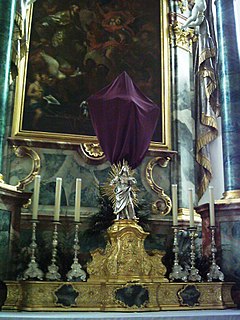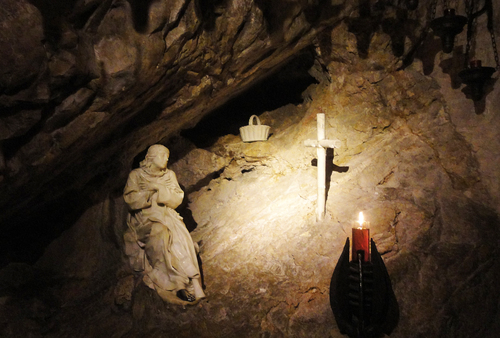
As I've noted previously, prior to the 1911 breviary reforms the feast of St Benedict on March 21 had a privileged octave. It was only a commemoration on March 25 due to the feast of the Annunciation, but the readings for March 26 were from Chapters 8&11 of St Gregory's Life of the saint.
The readings
Reading 1: The holy man, changing his place, not for all that changed his enemy. For afterward he endured so much the more grievous battles, by how much he had now the master of all wickedness fighting openly against him. For the town, which is called Cassino, stands on the side of a high mountain, which contains, as it were in the lap thereof, the foresaid town, and afterward so rises in height the space of three miles, that the top thereof seems to touch the very heavens.
In this place there was an ancient chapel in which the foolish and simple country people, according to the custom of the old gentiles, worshipped the god Apollo. Round about it likewise on all sides, there were woods for the service of the devils, in which even to that very time, the mad multitude of infidels offered most wicked sacrifice. The man of God coming there, beat the idol into pieces, overthrew the altar, set fire to the woods, and in the temple of Apollo, he built the oratory of St. Martin, and where the altar of the same Apollo was, he made an oratory of St. John. By his continual preaching, he brought the people dwelling in those parts to embrace the faith of Christ.
The old enemy of mankind, not taking this in good spirit, presented himself to the eyes of that holy father, not privately or in a dream, but in open sight. With great outcries the devil complained that Benedict had offered him violence.
The noise which he made, the monks heard, but the enemy they could not see. The venerable father told them he appeared visibly to him most foul and cruel, and as though, with his fiery mouth and flaming eyes, he would have torn him in pieces. What the devil said to him, all the monks heard; for first he would call him by his name, and because the man of God did not answer him, then would he fall reviling and railing at him. When he cried out, calling him "Blessed Benedict," and yet found that he gave him no answer, immediately he would turn his tune, and say: "Cursed Benedict, and not blessed: what have you to do with me? and why do you thus persecute me?"
Wherefore new battles of the old enemy against the servant of God are to be looked for, against whom willingly he made war, but, against his will, he gave him occasion of many notable victories.
Reading 2: Again, as the monks were making of a certain wall somewhat higher, because that was requisite, the man of God in the meantime was in his cell at his prayers. To whom the old enemy appeared in an insulting manner, telling him, that he was now going to his monks, that were at work: whereof the man of God, in all haste, gave them warning, wishing them to look to themselves, because the devil was at that time coming among them. The message was scarce delivered, when as the wicked spirit overthrew the new wall which they were a building, and with the fall slew a little young child, a monk, who was the son of a certain courtier.
At which pitiful chance all were passing sorry and exceedingly grieved, not so much for the loss of the wall, as for the death of their brother: and in all haste they sent this heavy news to the venerable man Benedict; who commanded them to bring to him the young boy, mangled and maimed as he was, which they did, but yet they could not carry him any otherwise than in a sack: for the stones of the wall had not only broken his limbs, but also his very bones.
Being in that manner brought to the man of God, he bid them to lay him in his cell, and in that place on which he used to pray; and then, putting them all forth, he shut the door, and fell more instantly to his prayers than he used at other times. And O strange miracle! for the very same hour he made him sound, and as lively as ever he was before; and sent him again to his former work, that he also might help the monks to make an end of that wall, of whose death the old serpent thought he should have insulted over Benedict, and greatly triumphed.





